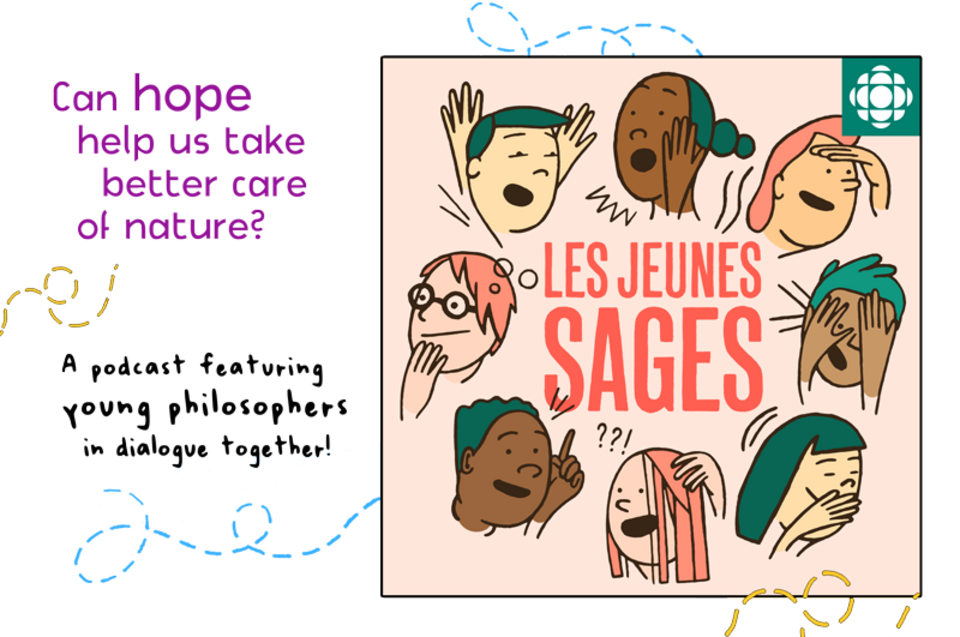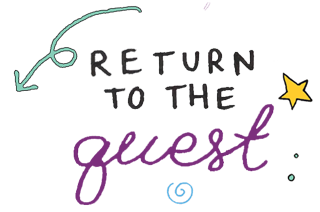
Building up hope
| Objective: To feed your philosophical reflections on hope with your family's help during lunch! |
Duration : 30 to 75 minutes
Material :
-
Sheets of paper and pen
-
Coloured pencils and markers
-
Your family
Instructions :
It's time to eat! Gather your family around the table for a delicious dialogue about hope. Explore the following questions, finding inspiration in the thinking prompts as necessary. Together, think of reasons to explain your positions and try to build an answer by combining your ideas! But don't worry if the urge to keep talking doesn't subside... philosophical picnics are an insatiable quest!
...
- Question 1: Is hope a positive experience?
- Thinking prompts : Before diving into the experience of hoping, explore what the concept of hope means for you and your family. Is it more of a feeling or an attitude, or maybe something in between? Is there more than one kind of hope? If so, how might we categorize different kinds of hope to figure out whether experiencing them is positive? Think back to the last times you felt hopeful and compare how the concept of hope felt for each of you. Did it make you feel good? Why or why not? How did experiencing hope affect you in the moment and afterwards? Brainstorm together about the kind of situations that lead to experiences of hope: do we feel hopeful when things are going well… or in the face of difficulty and suffering? Now, think back to the definition you came up with in your first Idea Stretching mission, and share it with your family: Does it (hopefully!) need an upgrade?
-
Question 2: Is there a difference between hope and expectation?
- Thinking prompts: As a family, play with this question by writing up some spontaneous lists: first, jot down a bunch of examples of the concept of hope, then do the same for the concept of expectation. Compare your results and try to figure out if there are similarities and differences between the examples. Is it possible to have hope without having expectations? Hmm… maybe it depends on the amount and the intensity of our expectations. Can hope lead us to feeling disappointed, even discouraged? The playwright Jean Kerr famously wrote that “hope is the feeling that the feeling you have isn't permanent.” Do you agree with this statement? Why or why not? Together, think about what hope allows us to do… and also what it might prevent us from doing. Then you can wonder: if you could only keep one concept—hope or expectation—which would you want to preserve and why?
- Question 3: Should we try to be hopeful?
- Thinking prompts: With your family, ask yourselves if you think we are better off as humans if we have hope. Do you think hope is a kind of virtue—a quality we should try to develop in ourselves to be good people? If so, what helps us become hopeful? For example, do we have to be optimistic to be hopeful? Do we have to have to believe in something to feel hope? Why or why not? Try to decide together if we need hope in our lives. Maybe we should hope (or not hope!) for certain things, like for some of our aspirations to come true? Hmm, maybe it depends on what the opposite of hope might be. Think of what hope’s mortal enemy would be, and whether it should also play an important role in our lives. Finally, try to finish the sentence: If hope didn't exist, then _________.
...
Bonus : Back in ancient Greece, hope didn’t have the best reputation as a concept. In fact, some thinkers saw it as an attitude that can only confuse and mislead us because it is based on having too little knowledge and being easily influenced. On this view, hope leads us to wishful thinking, or the tendency to believe what is most pleasing to us, instead of what is based on real evidence or good thinking. In other words, if we wish it to be true, it is true—no proof required. This is what we call a "fallacy" because of the thinking mistakes it involves. For example, a person might buy a lottery ticket every morning, convinced that it will be the day they will finally win… even though the odds are clearly against them. Or a student might believe they’ll pass their history test… even if they didn’t study and know nothing about the subject! Think back on your own life: Have you ever experienced wishful thinking or known someone who has? Did it lead to a false sense of hope… or did it help create a feeling of optimism and satisfaction? Can hope be a bad thing? Are there times we should just give up? Why or why not? |

| Tricks for tots : As humans, we seem to be a little mixed up about what we think hope is! Some of us see it as a pleasant feeling, others see it as tool to be happy, and a few of us even think it could be hurtful if we use it the wrong way. But what if hope was something we could give to someone else, like a present? Imagine the gift of hope! What does it look like? How do you wrap it? Draw your ideas and, if you’re feeling inspired, you can even create or build your gift of hope. Then, think of some people or groups who might really benefit from your gift of hope. Why do they need it? How could it help them out? Is it enough to solve the problem they are facing? Why or why not? |
Tips for teens : Parlez-vous français ? As you prepare your meal or digest your feast of delicacies and tasty ideas, listen to the Les jeunes sages podcast on nature. Drawing inspiration from reflections of the young philosophers, try to answer the questions: Can hope help us take better care of nature? Are we responsible for ecological sustainability? Why or why not? Do you agree or disagree with the answers given by the participants? Try to think of lines of thinking that have not been addressed. What other angles of the concept of nature deserve to be explored? Perhaps wonder about the link between hope and responsibility with respect to nature. Can taking responsibility for the planet’s health give us hope? Why or why not? If you can’t understand French, don’t worry! You can still wonder about the questions! You can even imagine that you are recording a podcast with your family… Family Wisdom! |
Share your creative reflections by sending them via email.
Include photos of your projects and notes of your thoughts, as well as your first name and your age!


